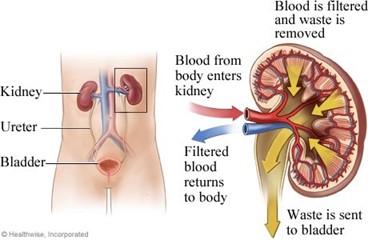Which of the following organs filters excess solutes from the blood?
Stomach
Spleen
Kidney
Gallbladder
The Correct Answer is C
The organ that filters excess solutes from the blood is the kidney. The kidneys are a pair of bean-shaped organs located on either side of the spine, just below the rib cage.They are responsible for filtering waste products and excess fluid from the blood and excreting them in the form of urine.
The other options are not correct because they do not accurately describe the organ that filters excess solutes from the blood. The stomach, spleen, and gallbladder do not filter excess solutes from the blood.

Nursing Test Bank
Naxlex Comprehensive Predictor Exams
Related Questions
Correct Answer is C
Explanation
The organ that filters excess solutes from the blood is the kidney. The kidneys are a pair of bean-shaped organs located on either side of the spine, just below the rib cage.They are responsible for filtering waste products and excess fluid from the blood and excreting them in the form of urine.
The other options are not correct because they do not accurately describe the organ that filters excess solutes from the blood. The stomach, spleen, and gallbladder do not filter excess solutes from the blood.

Correct Answer is B
Explanation
Urea is a waste product that is formed when proteins are broken down in the body. It is excreted by the kidneys in urine, but small amounts can also be excreted by sweat glands in sweat. The other options are not substances that are excreted by sweat glands in response to the breakdown of proteins and the formation of ammonia. Lysozymes are enzymes that break down bacterial cell walls, water is a component of sweat but is not specifically related to protein breakdown, and sebum is an oily substance produced by sebaceous glands to lubricate the skin.

Whether you are a student looking to ace your exams or a practicing nurse seeking to enhance your expertise , our nursing education contents will empower you with the confidence and competence to make a difference in the lives of patients and become a respected leader in the healthcare field.
Visit Naxlex, invest in your future and unlock endless possibilities with our unparalleled nursing education contents today
Report Wrong Answer on the Current Question
Do you disagree with the answer? If yes, what is your expected answer? Explain.
Kindly be descriptive with the issue you are facing.
